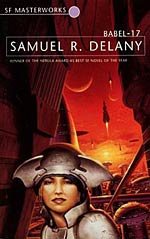
![]() couchtomoon
couchtomoon
8/27/2014
![]()
"'All the misunderstandings that tie the world up and keep people apart were quivering before me at once, waiting for me to untangle them, explain them, and I couldn't'" (ch. 2).
Talk about a novel that transcends that limited retro-future aesthetic, Babel-17chugs way ahead of its respective decade as even authors today fumble to attain the ethers of a world like Samuel Delany has dreamed. Strange, beautiful, and futuristic, Babel's lingering noir tone coalesces with a techno-background that brings to mind the cyberpunk of the 80's and 90's, without so much of a "jacking-in" or a singularity event. Laser lights and crystal interfaces streak the scenery while disembodied ghosts and surgically-accessorized lowlifes aid our unflappable heroine as she chases down a mysterious language, all while wearing copper lipstick.
For readers of mostly contemporary SF, this is like William Gibson meets Neil Gaiman.
Former military intelligence linguist, and celebrity poet, the beautiful, exotic mastermind, Rydra Wong, is recruited by the galactic union to crack an unintelligible code, dubbed Babel-17, which has been noticed in the space noise preceding terrorist events. Intrigued, Rydra selects a crack space crew, which includes a fuzzy, saber-toothed wrestler and a few suicided ghosts. They shoot off into the stretches of the galactic union to catch the next act of sabotage, but a traitor on board could spell trouble for the team. Besides, does Rydra really want to stop the violence, or does she just want to meet the people behind this perfect language?
The above synopsis, like most of my summaries of well-written works, doesn't do justice to Delany's style. The New York literary critic employs a poetry-like prose where "evening brushed blue fingers on his eyes," (ch. 1) and "ambition like a liquid ruby stains your brain...," (ch. 3). Delany compares the rear sight of a ship leaping into hyperstatic space to "[dropping] a gem in thick oil. The brilliance yellows slowly, ambers, goes red at last, dies" (ch. 2). That's not to say the prose is thick with poetic ramblings; Delany economically parcels out these elegant phrases within the purposeful action of the plot. Even when the narrative's character observations are minute and physiology-driven, (given his protagonist's penchant reading miniscule motor movements, as well as minds), they don't bog down the story. After all, this is a story about language, the most efficient language of all. Delany's prose stays in character.
A hero is only as smart as their actions can demonstrate, and Rydra is a genius. When her ship is trapped in an unknown orbit, she uses the motion of freefall marbles to figure her relative location to Earth. To prevent ghost crew conversations from fizzling from her memory, she translates them to Basque, because "... the original words were lost, [but] the translation remained" (ch. 2). Again, economy is key in this 300-page novel, and these little moments define Rydra without drowning her, or oversimplifying her.As for Rydra Wong, she's a cut above the normal class of female heroines in modern day SF. Where many modern authors dress their women protags in an injured jadedness (because an unhappy woman is an interesting woman), Delany punches up Rydra's complexity with a few concise, yet emotionally-charged scenes. To counter that complexity, Rydra's personality exudes a brightness that buoys herself (and the story) against the threats of betrayal, futility, and space pirates.
Even Rydra's sexiness failed to earn an eyeroll from this reader. Sure, she's beautiful, enchants men, surrounds herself mainly with men, and sometimes walks around bars with her top off (so does everybody else in Babel's underworld), but Delany's characterization of Rydra eschews objectification. We know she's beautiful because of the way people react to her, but her confidence eclipses her sexuality. There is no doubt that Rydra is sexy, but that trait is demonstrated through action (not sexy action, mind you), and not by descriptions of her cleavage.
I'm a sucker for dark novels with chipper characters, and Rydra and her crew exude a contagious exuberance that is rarely found in the lower classes of urban fantasies. They joke, they hug, they play marbles. There is sadness, sure—two of the crew are mourning the third of their polyamorous triple, and Rydra's genius is so unfeasible, she barely understands herself—but the truth about dystopia is that people find happiness in crowded corners. Especially when a group of them are blasting away from the refuse of civilization.
Babel-17 is not without its flaws. Especially in the early chapters, much of the dialogue serves only as exposition, which rings artificial against a mostly genuine-feeling story. To keep the novel short and impactful, sometimes action happens off-scene, but I can't help but think this was a good judgment call. For example, the reader misses the moment that Rydra meets and recruits her team of suicided ghosts, because the narrative follows an otherwise unimportant character who is seduced and subsequently mugged by a different suicided ghost. Seductive phantasmic muggings are WAY more interesting than recruitment trips. That's always the rule.
Highly recommended for fans of what I would call the happy-dark realm, where charismatic characters play in a shadowy background, wrapped in expressive prose. I'm starting to realize that this is my thing.
On second thought, Babel-17 should be enjoyed by everybody.
http://couchtomoon.wordpress.com